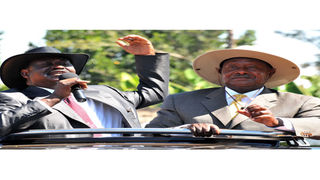
Raila Odinga (left) joins Uganda's President Yoweri Museveni on the campaign trail in Uganda, December 15, 2010.
| FilePolitics
Premium
Yoweri Museveni and the Kenyan connection
As the fallout from Deputy President William Ruto’s aborted trip to Uganda injected a new dimension to his battles with President Uhuru Kenyatta, one name that was severally mentioned was that of Uganda President Yoweri Museveni.
Though never said directly, supporters of President Kenyatta see the Ugandan leader as interfering in Kenya’s internal affairs. This perhaps could have been the reason that prompted the Ministry of Foreign Affairs of Uganda to issue a statement to deny links to the aborted trip.
Foreign policy
“Our foreign policy is very clear that we don’t interfere in the internal affairs of any country, whatsoever. We have no authority, we have no power over Kenyan government. They have their reasons why they prevented HE Ruto from coming to Uganda and that should be channelled to the Kenyan High Commission,” Mr Okello Oryem, the State minister for Foreign Affairs said in a statement on Thursday.
However, since at least 2007 elections, the Ugandan leader has been a factor in the Kenyan elections: he tried to mediate between then President Mwai Kibaki and Raila Odinga after the disputed 2007 presidential election, all the current leading political figures in the country have trooped to him as they sought the presidency. Both Dr Ruto and ODM leader Raila Odinga have appeared with him at campaign events in Uganda, often to the chagrin of the country’s opposition.
According to Prof Winnie Mitullah, a governance expert, the issue is that Mr Museveni wants to assert his influence in the region after satisfying himself that he has unshakable control of Uganda.
“Remember (former Libyan leader Muammar) Gadaffi, even our elders visited him. It is the same for Museveni because he is firmly in control of Uganda and remains the president as along as he likes and he can only think of a bigger position or influence. He would love to be the point of reference for the region and therefore that makes him do the things he does,” said Prof Mitullah.
She added that: “The problem however is that he is very autocratic in his own way if we go by liberalism and the fact that one must leave power at some point. The argument is that he is not a good example. No country in Africa which is democratic wants to emulate what he is doing.”
In a letter to ODM MP Junet Mohamed for “the personal disrespect and insults” at President Museveni and Uganda, the ruling party National Resistance Movement (NRM) reiterated the Ministry of Foreign Affairs’ non-interference message but stated that Mr Museveni’s intention of pan-Africanism as the reason for his relationship with among others, Dr Ruto.
“One of our key attributes is the promotion of the pan-Africanism spirit of brotherhood. We don’t do this to undermine or to ‘capture power’ in any country as you alleged,” NRM said in the letter which Mr Mohamed says was served on him by Kapseret MP Oscar Sudi, a close ally of Dr Ruto.
Complicated relationship
Mr Odinga’s relationship with Mr Museveni has often been complicated with the ODM leader often seen as closer to opposition figures, among them Kizza Besigye. Both have strong personalities and perhaps Mr Museveni feels an Odinga presidency could jeorpadise his ambition to lead the proposed East African Federation. Following the hotly disputed 2007 presidential election, there was a perception that President Museveni worked behind the scenes to support then incumbent President Mwai Kibaki against Mr Odinga. In Mr Odinga’s then Nyanza and Western backyards, the rumour went further that the Ugandan leader even sent in his security people to help Kenyan security teams quell the post-election chaos. Dr Ruto meanwhile has been enjoying a blossoming friendship with President Museveni. When they came together with Mr Kenyatta in the run-up to the March 2013 elections, and as they sought friendship with regional leaders amidst the crimes against humanity charges against them, one of the leaders they spoke was Mr Museveni.
For Prof Mitullah, distinguishing what President Museveni does as a partisan in Kenyan politics and his actions as a neighbour is sometimes difficult.
“When a neighbour is trying to undermine you and when a neighbour is just being a neighbour sometimes gets mixed up. That is how I see Museveni: He can pull whichever flag he wants at whatever time,” he said.





